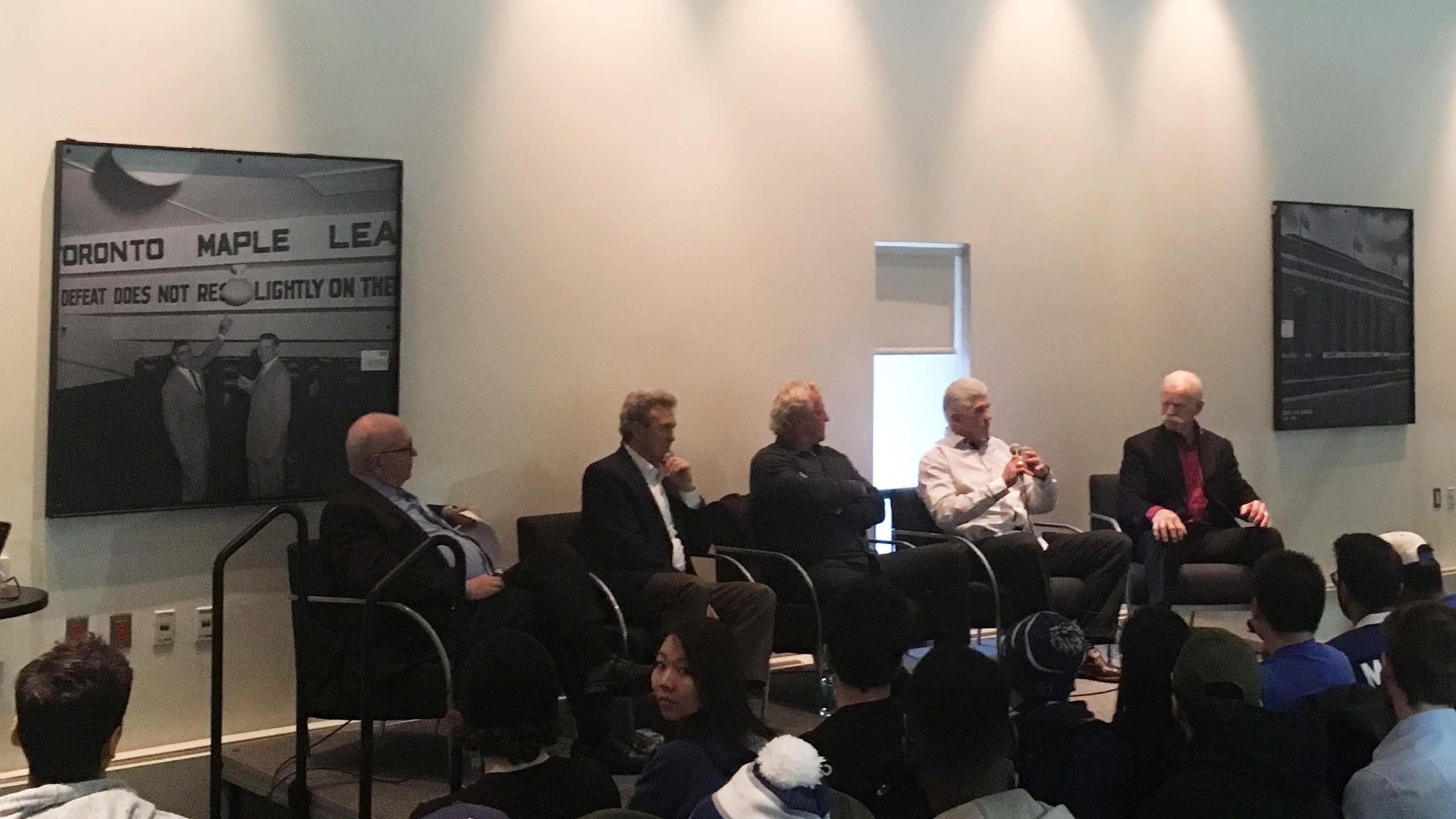By Daniel Rocchi
Most Toronto Maple Leaf fans remember Feb. 7, 1976 as the night that Darryl Sittler recorded the only 10-point game in NHL history. Sittler scored six times against the Boston Bruins and assisted on four more in a game that became the defining moment of the hall of fame centre’s 15-season career.
But Sittler’s former linemate, Lanny McDonald, remembers it somewhat differently.
“First of all, he wouldn’t have gotten 10 without me,” said McDonald from behind the bushy moustache—now white instead of red—that helped make him one of the most iconic players of the 1970s and 80s.
“I scored the first goal [of the game] and if you look at the last goal I got the last assist,” he said, earning a laugh from the audience. “So without me at the start and the end, he was nothing.”
The two shared a stage with fellow Leafs legends Paul Henderson and Rick Vaive, sitting beneath the domed roof of the arena where Sittler scored his 10 points, speaking to the students that now call the rink at Maple Leaf Gardens home ice, as all four of them once did.
Sittler, McDonald, Henderson and Vaive were all members of a panel at the Mattamy Athletic Centre on Thursday, addressing a sports marketing class from the Ted Rogers School of Management.
The 200-student class is the hockey-themed successor to “Global Sports Marketing: The Business of Basketball”, a course offered last year at TRSM in partnership with the Toronto Raptors.
With the Leafs celebrating their centennial season in 2016-2017, it was a logical next step for a course at the university that now operates its athletics department out of the storied arena at the corner of Carlton and Church streets.
“We always try to link it to marketing and the greater business landscape,” said Cheri Bradish, an associate professor of marketing management and the executive director of Ryerson’s sport innovation hub. “We knew that we [would] target the Leafs as soon as the Raptors were done because of the hundredth anniversary.”
The four former players fielded a variety of questions about their careers and the state of the game today, including their thoughts on fighting.
“One of the things I didn’t like that evolved in the game [was that] there were fights just for the sake of a fight,” said Sittler, who earned 948 penalty minutes over 1096 regular season games. “In your own lives you can get the anger and the frustration going and you might do some things that you might not like doing, and that can still happen in the game because it’s so intense.
“If a guy takes a cheap and now you say, ‘okay let’s release this and drop the gloves,’ then I’m okay with that if it’s for real and it’s not pre-meditated, so to speak.”
The players were in agreement when asked how they think they and other stars of their eras would fare in the modern game that’s far faster and lower-scoring than it was when they played in the 60s, 70s, 80s and early 90s.
“I think we all would probably be as successful today as we were in our generations,” said Vaive, who had three consecutive 50-goal seasons with the Leafs from 1981 to 1984 and played his final NHL season with the Buffalo Sabres in 1992.
“I think you could take Rocket Richard from the 50s and today he would still find a way to score 50 goals, regardless of whether the goalies are better or not,” he added. “The great players would find a way to get it done in any era, and I truly believe that.”
With more than 1,600 career goals and nearly 3,400 career points between them, there were plenty of worthy candidates when the players were asked to pick the most memorable game of their careers.
Henderson, unsurprisingly, picked the final game of the 1972 Summit Series between Canada and the Soviet Union, teasing his fellow panelists by pointing out that his series-winning goal was dubbed the sports moment of the century by the Canadian Press.
Henderson, though, was far more critical of the tally that made him a household name.
“I scored seven goals in that series and I scored the winning goal in games six, seven and eight,” said Henderson. “The only garbage goal I scored was the last one.
“You good people go, ‘well, how the hell did you get this kind of recognition if it’s a terrible goal?’ and I’ve been riding it for 45 years.”












Leave a Reply